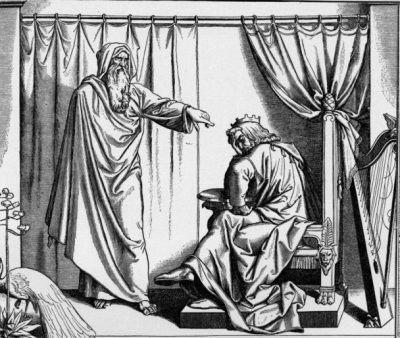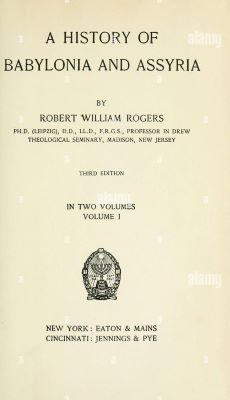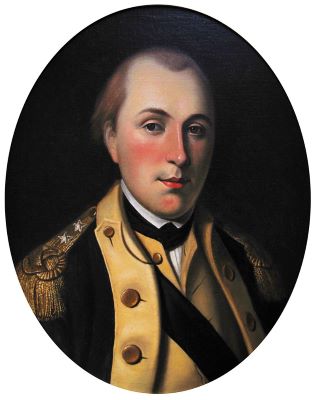
The story of David and Nathan is one of the most dramatic in the Hebrew Bible. Even as one reads the words, one can see the figures in one’s mind. There is no mention of Nathan extending his arm in the direction of David, yet we see it. There is no mention of Nathan pointing a finger at David, yet we see it. There is no mention of David’s physical reaction to the words and gestures of Nathan, yet we see it. Only when Nathan is telling his parable, does the storyteller mention an emotion, the anger of David. The story teller leaves it to our imagination to visualize David’s appearance after Nathan’s exclamation.
This story exemplifies the oral nature of biblical storytelling. It cries out for a physical performance. Undoubtedly, that was how most Israelites originally experienced the story – not read silently alone but as a public display. The op-ed pieces of yesteryear were performed in ancient Israel.
One key ingredient in the story is frequently overlooked. It is not the historicity of the story but its believability. There is no sense in the story that it lacks validity. The story is not one of science fiction, fantasy, or even dreams. It is a presented as a real world event that the audience easily could believe as true. There is no surprise in the display of truth to power. There is no sense that it defies all credulity that someone could call the king to task. There is no astonishment about the actions of Nathan. The only uncertainty is in the reaction of the accused.
That credibility extends beyond the prophet denouncing the action of the king to his face. Just as Nathan’s declaration garners no surprise, neither does David’s reaction. The king’s repentance is presented in just as routine a manner as Nathan’s charge. As far as the audience is concerned, it is expected that a prophet would call a king to task. It is equally expected that the king would respond positively when he heard the words of the prophet and repent his wrongdoings.
In ancient Israel, the word of someone sent by the Lord trumped the power of the king. Part of the uniqueness of ancient Israel was the belief that an individual, or at least a prophet, could confront the king. Can you imagine someone standing before Sargon the Great and bellowing “Thou art the man!”? How about before Hammurabi? Sargon II? How about before Pharaoh? With Pharaoh, it actually is easier to imagine. There is a major story from the ancient Near East precisely involving a person sent by the Lord to exclaim “Thou art the man!” The person is Moses, the prophet of prophets in the biblical tradition.
The origin story of Israel in history and celebrated to this very day involves an individual confronting a person in power. Time and time again, the Israelite tradition told the story the prophet challenging the power of the king in the name of the Lord. Such occurrences were not isolated incidents but part of an ongoing pattern:
Samuel against Saul
Nathan against David
Ahijah against Rehoboam and Jeroboam
Elijah against Omri and Jezebel.
The independence of the prophet reaches a point where a king can even make of fun of it while not ignoring it:
1 Kings 22:8 And the king of Israel said to Jehoshaphat, “There is yet one man by whom we may inquire of the LORD, Micaiah the son of Imlah; but I hate him, for he never prophesies good concerning me, but evil.”
So how is that Israel was so different? Was it something in the water? Did the landscape or ecology render Israel different? Did Canaanite kings act the same way only we do not have their stories? The obvious answer is “no.” The difference is a cultural one that needs to be understood within Israel’s history. Can you imagine Russia or China televising to the world a direct challenge to a nominee of the political leader of those countries? The idea is absurd. On the other hand, the United States was born in a declaration levied against a king who was compared to a Pharaoh. Truth to power is in the American DNA.
What about ancient Israel? What is it in the history and culture of ancient Israel whereby a prophet could challenge a king and a king was expected to adhere to the word of God expressed through this non-royal person?
And as with the story of Nathan and David, the idea itself of Moses challenging Pharaoh is presented as a believable part of the story. It is not a miracle that he stood before Pharaoh. It is presented to the audience as something which could occur. But how in the real world could anyone do that? There is nothing in the Egyptian cultural construct that suggests such a challenge was possible. The Egyptian tradition despised the hot head, it did not make a hero of one who waxed hot with anger before king. When Sinuhe returned to Egypt from the land of Canaan is was to be reunited with Pharaoh so he could die and be buried as an Egyptian. That was the Egyptian ideal. Israel’s version was quite different. It was legitimate to challenge the authority of the king who had abused his power.
Moses, too, could be held accountable. He did have immunity. Instead he wandered in the wilderness until he died. He only glimpsed the Promised Land (remember the final scene with Charlton Heston).
So too, Israel had to wander in the wilderness. The people of the covenant were not above the law either.
Israel and the United States share a tradition where no one is above the law. Not Moses, not the King, not the people, not the President, not no one. At least until now.






Great job on the latest IHARE newsletter. I read it twice.
Best regards,
Zacc
Nailed it. I’ve been thinking a lot about this passage.
RPF
Peter
Nice. Timely. World on fire
Hosley
I cannot help but notice how much you dislike President Trump and his platform. As a fellow historian, I know that some of your positions need further research before you publish them in your newsletter.
One of the most inflammatory statements made is “House of Representatives and the declaration by one candidate that if he loses again, there will be another insurrection, and if he wins, there will be divine retribution.”
Statements like these only alienate you from portions of the readership. It does not help successfully solicit donations for IHare.
Your constant reference that if President Trump succeeds as the second President to secure two nonconsecutive terms of office, he will end Democracy as we know it now. The fear is that Trump, unrestrained by the need for re-election, might escalate efforts to undermine democratic processes and institutions. Do you really believe that?
As a Devil’s Advocate, look at how Democracy is threatened during the Biden administration. Dictators or authoritarians employed some of their tactics.
Executive Orders: President Biden signed many executive orders during his first weeks in office. Some argue that this approach bypasses Congress and resembles the behavior of a dictator. However, it’s essential to note that executive orders are a common tool U.S. presidents use to implement policy changes.
Censorship and Control of Speech: Critics have raised concerns about the administration’s efforts to control speech and suppress dissenting viewpoints. For instance, the pursuit of institutionalized censorship has been compared to tactics used by foreign dictators.
Independent presidential candidate Robert F. Kennedy Jr. accused President Joe Biden of being the first president in history to use federal agencies to censor political speech or silence opponents. Kennedy referred to his lawsuit against the federal government, alleging they censored his social media statements against vaccines.
Promotion of Ideological Agendas: The Biden administration’s focus on promoting divisive ideologies, such as Critical Race Theory (CRT) and the 1619 Project, has drawn criticism. Some argue that these efforts resemble authoritarian attempts to shape public discourse and education.
They are attempting to silence opponents through government agencies. The former President has been investigated and prosecuted before and after his term as the President of the United States, from Russia Gate to the two impeachment hearings and to the four current criminal cases he is facing.
Even the general public has not been immune to prosecution, as evidenced by the IRS’s infamous targeting of conservative nonprofits during the Obama-Biden Administration.
The weaponization of government in pursuit of political gain poses a dangerous threat to Democracy. As a historian, you should be just as alarmed as I am by the events over the last decade. Congress must exercise its oversight authorities to ensure that prudence and objectivity guide the executive branch’s administration of justice.
I can go on about this topic, but I have made my point. As historians, we need to be balanced and objective. We are stewards deciphering our past and help guide us through our future. I don’t think it is our role to be political hacks.
To Your Success,
Arnold Restivo
Town Historian